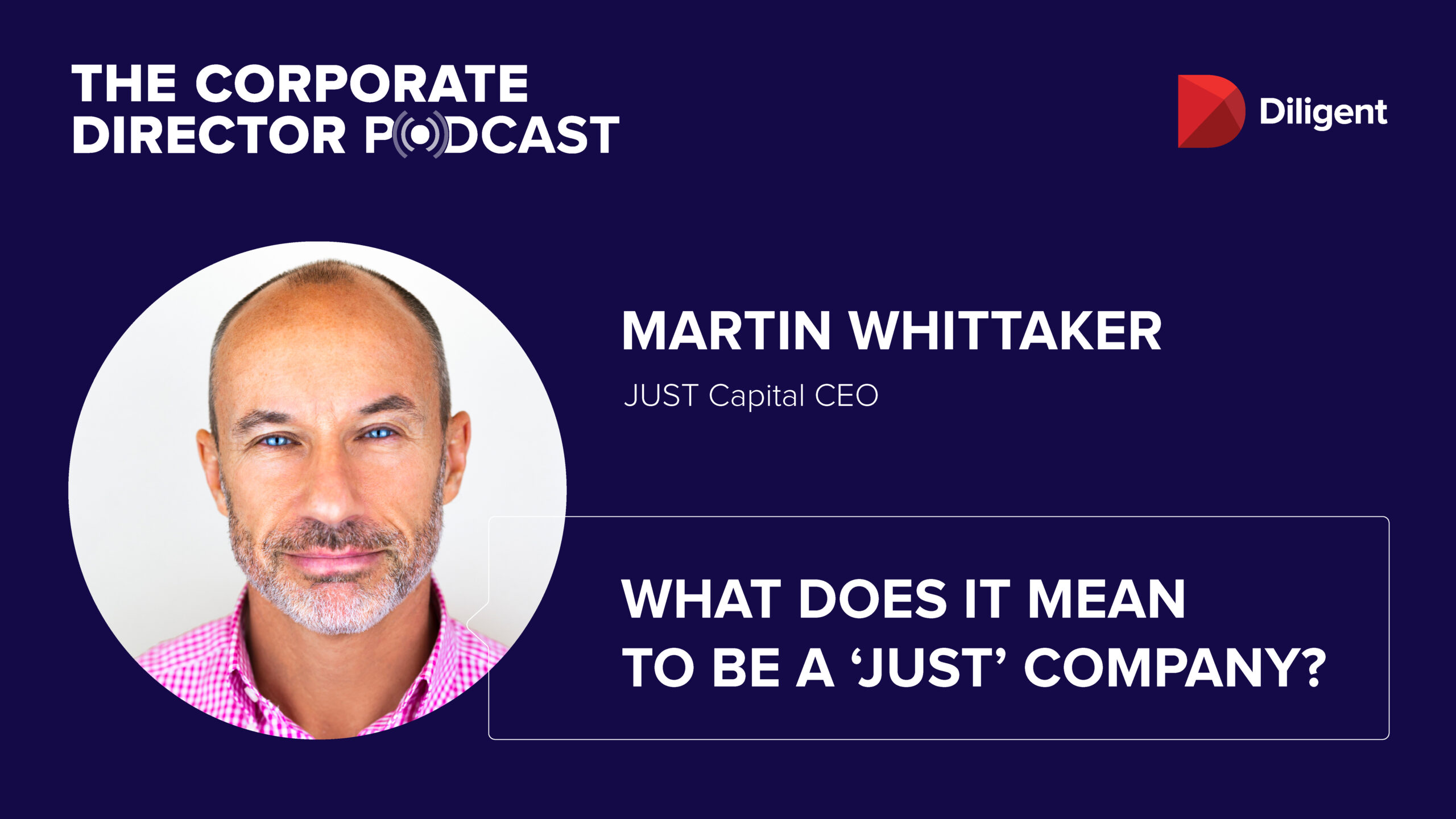Listen to Episode 38 on Apple Podcasts
Guest: Martin Whittaker, CEO, JUST Capital
Hosts: Dottie Schindlinger, Executive Director of the Diligent Institute, and Meghan Day, Senior Director of Board Member Experience for Diligent Corporation
In this episode:
- The changing definition of a “good employer.”COVID-19 and the ongoing push for equality means companies need to stop avoiding and start addressing the tough questions.
- The ongoing challenge of ESG metrics.We all know what ROI is and how to measure it—how do we do the same for ESG?
- This year’s election result doesn’t change corporate responsibility. Polling shows individuals have concerns that companies must answer to, regardless of who wins the election.
Summary
Many companies have increased their focus on ESG (environmental, social, governance) issues in recent years. Nonprofit JUST Capital makes them its business.
Founded by hedge fund manager, conservationist, and philanthropist Paul Tudor Jones—with a board that includes Deepak Chopra and Arianna Huffington—JUST Capital is, in CEO Martin Whittaker’s words: “a group of folks who cared very deeply about solving societal challenges and believe strongly that business and markets have a very prominent role to play.”
JUST Capital measures corporate performance in the stakeholder economy using research, rankings, indexes, and data-driven tools with the goal to address systemic issues at scale—including income equality and lack of opportunity. This year, it made headlines for its COVID-19 Corporate Response Tracker, which tracks how the largest employers in the U.S. contributed to community relief funds, dependent care, and leave policies.
In this episode, co-host Dottie Schindlinger talks to Whittaker about what it means to be a good employer today, the challenges of ESG reporting and metrics, and what companies and boards should be thinking about in the weeks leading up to the US presidential election.
The changing definition of a “good employer”
COVID-19, the pandemic’s economic impacts, and heightened focus on racial and social issues have changed what it means to be a good employer, Whittaker says.
The conversation has moved from “softball” areas like employee engagement andwork–life balance to“really hard issues, like what are you doing about paid sick leave, what you doing about dependent care?”
Protecting the health of your workforce now includes such questions as: Are you paying for personal protective equipment or do they have to pay for that themselves?Furthermore, Whittaker asks, how are you dealing with mental well-being?
“People are going through Zoom fatigue,” Whittaker says.“We’re all in a state of high anxiety, and so it’s not just about worker safety in the traditional sense.”
“Now it’s about mental and physical well-being.”
— Martin Whittaker, CEO, JUST Capital
“Now it’s about mental and physical well-being.”
— Martin Whittaker, CEO, JUST Capital
The ongoing challenge of ESG metrics
“Treating your workers and the communities where you operate well makes you a better business, but how do you measure that on a consistent basis?”
— Martin Whittaker, CEO, JUST Capital
“Treating your workers and the communities where you operate well makes you a better business, but how do you measure that on a consistent basis?”
— Martin Whittaker, CEO, JUST Capital
The 22 new ESG principles borne out of the World Economic Forum earlier this yearhelped kickstart an evolution of ESG frameworks. Schindlinger asks: Should these mechanisms should be more widely adopted in the US?
Amid the plethora of metrics out there, “If that just becomes another set of reporting criteria, you’ve made the situation worse,” Whittaker replies. Rather, focus the conversation on what these metrics mean.
“When I think of total shareholder return and financial reporting, you understand what I’m talking about. When I say ROI,you know what I’m talking about. Butwhen we talk about reporting data on ESG, we’re not quite sure what it means,” Whittaker says.
To measure workers’ economic participation or economic mobility, companies need to agree on the outcomes they are trying to create and what value creation really means. “Until there’s agreement on the answers to such questions,” Whittaker says,“it’s very difficult to have a conversation or agreement around metrics.”
This year’s election result doesn’t change corporate responsibility
“What should companies be thinking about leading up to the US presidential election?” Schindlinger asks.
In the summer of 2016, Whittaker says, polling about business attitudes revealedpeople were focused on“good jobs, restoring faith, and basic principles of dignity and respect at work.”This year, concerns have expanded to job security, return to work, racial equity, and mental well-being.
Such insights paint a path for the private sector,especially for large companies.
“They can’t just be all about their shareholders,” Whittaker says.“They can’t be all about short–term profitability.They have a bigger role to play.”
Think much bigger and think holistically, he advises.How is my company really focused on the workforce and uplifting the communities we serve? Are we’re doing everything we can? Do we really feel like we are at the forefront of thinking on this idea of value creation in this modern economy?
“Whoever wins (the election), one thing we know is that people expect companies to do more.”
— Martin Whittaker, CEO, JUST Capital
“Whoever wins (the election), one thing we know is that people expect companies to do more.”
— Martin Whittaker, CEO, JUST Capital
Also in this episode . . .
Whittaker and Schindlinger imagine what boards might look like 10 years from now:more virtual, more diverse, more comfortable discussing and grappling with racial issues and pay equity, and “more uplifting,” in Whittaker’s words. “Here’s hoping we don’t have to wait all 10 years,” says Schindlinger.
Schindlinger asksWhittaker what he’s read or listened to that’s made him think about governancedifferently lately. He cites the weekly memos of Marty Lipton, “one of the leading thinkers of stakeholder governance,” and the podcast for the“1619 Project,”the groundbreaking initiative on slavery by the New York Times—a particularly timely and prescient examination as the “S” in ESG rises to the fore.
“The American public wants and expects businesses to lead on societal issues,” Whittaker says.


